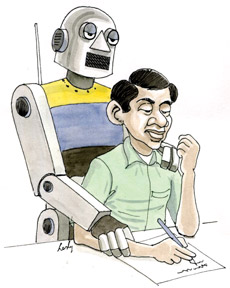More on ‘instant novels’
 One need not know spelling and grammar. The computer will do it for
you. Any child could write a story for children. Whether it would be
readable and suitable the computer would not be able to tell us. At
least not yet. Most children who like to read, and who have the
opportunity to read, also like to write. Such writing should be for the
reading pleasure of the child’s family. One need not know spelling and grammar. The computer will do it for
you. Any child could write a story for children. Whether it would be
readable and suitable the computer would not be able to tell us. At
least not yet. Most children who like to read, and who have the
opportunity to read, also like to write. Such writing should be for the
reading pleasure of the child’s family.
Copying will become easier, like it is with films today. We have
heard of film directors, the only directions they give are for the cast
to watch the original Hindi films several times! We even had writers who
could produce at least three novels after watching one English film,
even Wild West stories in Sinhala, as if they were his own creations.
 Very soon we can expect more efficient translation software. Then all
our translators would have to do is let the computer do the translation
and put their name to it in the publication. It would in a way be better
than some of the translations today, which are outright plagiarizing of
previous translations, probably not even seeing the cover of the
original English book, or writing something completely different from
the original, like translating Naples as ‘Nepalaya’. Very soon we can expect more efficient translation software. Then all
our translators would have to do is let the computer do the translation
and put their name to it in the publication. It would in a way be better
than some of the translations today, which are outright plagiarizing of
previous translations, probably not even seeing the cover of the
original English book, or writing something completely different from
the original, like translating Naples as ‘Nepalaya’.
Perhaps Prof D C R A Goonetilleke could coin a new term for these
electronically generated novels, because they would be going beyond
post-modernism and even post-post-modernism. We cannot use the term
electronic-novel because it is already in use for the digital format of
novels, and are popularly called e-novels.
One good thing could be that some of our politicians need not use
ghost writers. Their computer could be the ghost writer and their
secretaries could be the interphase. Today we have software for Poetry
Writing too. All you have to do is decide what type of poem you want to
write, a sonnet or a haiku, and it will guide you for the number of
lines, the rhyme scheme.
And there is software that will even auto-generate poems for you.
There has been software to teach poetry to students, but they were meant
to help the child learn to write poetry, to learn to be creative, but
the new poetry writing software is the Frankenstein born from these
early programs.
For many years there has been software for writing a Thesis,
Dissertation or a term paper, or to write an essay or an article, but
they have not been very popular except among those who are looking for
short-cuts or are too plain lazy.
Even the primitive word processing software like WordStar and
WordPerfect offered facilities of spell and grammar check, thesaurus,
word count, ‘cut and paste’ and also ‘find and replace’
As long ago as 1983, I have seen people claiming to be qualified
programmers, cheating their bosses, by using computer generated
programs. On the Wang VS computers there was a software called Cobgen to
do it for them. We could consider the Report Program Generator (RPG) on
IBM as the first step towards all the program “writers” and today’s
novel writer.
In a way what is now offered with glorified and tempting names are
just more glorified word-processing software. Do we call mass produced
work using such software to be novels, as we have known the novel all
these years? Do we consider them as artistic creations?
A really creative writer still can give us a great novel, without
even the use of a old fashioned typewriter, or he could use a
typewriter, like Erawwala Nandimithra, one of the leading Sinhala
writers today, a writer who had won so many Literary awards, a writer
who seems to believe that he should be read, and not heard.
He could not run spell checks, ‘cut and paste’ or ‘find and replace’,
or even insert, overwrite or delete on his manual typewriter.
Perhaps that what would have helped him to create such great novels
and short stories. At the other end, a writer today could write his poem
or even a novel on his smart phone, an opportunity which was not
available to Mahagama Sekara who had to jot down his idea on the back of
a cigarette pack on his way home by train.
All modern technology is meant for the benefit of mankind, as long as
we do not let them take over the world and enslave us.
The way technology is taking over all creative arts, if we are not
careful, we could end up trying to pick the grain from the chaff or
throw it all away.
[email protected]
|



